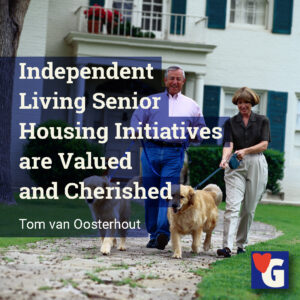
Independent living senior housing is a common practice around the world. Senior citizens decide to join hands, hire or buy a house together, and appreciate each other’s company. For them, it’s also a way to economize. When required they together hire care or other services.
Examples of such practices are the Village-to-Village-Network in the USA and Trabensol near Madrid in Spain. The Seniorengenossenschaften in Germany are also an excellent example of intense collaboration between senior citizens.
It is good to take a closer look at the discussion to better understand the complexities of independent living senior housing initiatives. From a recent example in Belgium, I explain the discussion. This example shows how important it is to timely start such an initiative and pay close attention to the rules.
Some of the links might be affiliate links. As an affiliate associate, we earn a small commission when you purchase any of the products offered through the shared links at no extra cost for you. This helps us to maintain this website.
Table of contents
A political nightmare

Politically, Belgium is a nightmare. There are three separate language regions. The 2 most important are Flanders and Wallonia. Extreme-right-wing politicians dominate the Flemish government. The government of Wallonia is dominated by social democrats.
To make matters more interesting, the capital city of Belgium, Brussels, is semi-autonomous with its own regional government. In Brussels, which is also the capital city of Europe, both Flemish and Walloon meet head-on. Politics are further complicated by the fact that members of the House of Representatives can be mayors of cities at the same time.
Moreover, these mayors have some difficulty separating their governmental responsibilities from their political creed. The complicated Belgian politics is well illustrated by the fact that it took the Belgian national political parties more than 500 days to form their most recent government. It was installed in late November 2020.
A bureaucrat’s dream

Any political nightmare is a bureaucrats dream. Those of you who have seen the BBC series Yes Minister, understand what I mean. A sad example of overzealous bureaucracy is the way in which the Flemish government handles citizen care initiatives.
In a small and insignificant village in the countryside of Flanders, there is a villa where seven senior citizens live. The problem with the villa is that it started as an investment initiative. Someone bought the house, turned it into a senior citizen home and rented rooms to senior citizens. Without the proper bureaucratic consent from the Agency for Care and Health.
This agency is run by the Flemish government. The agency qualified this specific senior citizen home initiative as a residential care centre. Because the home lacked the proper license, the agency ordered the house to be closed and the senior citizens to be relocated to a government facility.
Budgetary limits

The consequences of the agency’s action were rather predictable. The seniors who lived in the house were very upset. Regional and national journalists picked up the news and a public and political outcry followed.
The agency did not budge: “A residential care centre requires recognition and recognitions will not be issued until at least 2030.” In itself, the agency was right. In its disregard of the concerns of the seniors who lived in the house, its decision and attitude were of course totally wrong. The agency did not even contact the occupants.
Of course, government approval for residential care centres is not exceptional. In most countries, these centres require a governmental license. This license entitles these centres to government funding. Apparently, the Flemish regional government has reached its budgetary limits.
From senior home to co-housing

With the help of a lawyer, the senior citizens who lived in the house came up with a solution to their problem. They started an Independent living senior housing initiative. They call it co-housing.
One of the senior citizens started a foundation, the foundation hired the house from the owner and rehired it to the occupants. The residents pay for everything themselves. The foundation hires household assistance. When care is needed the senior citizens hire and pay external help themselves.
The senior citizens understood that any attempt to adapt the rules to their convenience would come in vain. Even so, their legal actions are no guarantee that the future of the villa as a senior home is certain. Residents continue to fear eviction. The agency still wants to lock up the seniors in one of their government homes.
Corona-virus

Shortly after the agency’s eviction attempt the coronavirus clearly demonstrated the vulnerability of large-scale residential care centres. In Flanders, thousands of residents of these centres died prematurely and under dreadful conditions, either in the centre or in hospitals.
Like most governmental agencies the Flemish Agency for Health and Care was totally inadequate in its response to the pandemic. However, bureaucracies are never punished for inadequate behaviour. This is why they never change. To fight them is totally senseless.
The occupants of the villa, of whom none suffered from the virus, were right in designing their own future. That they had to use lawyers to do this was sad but inevitable. The more rules and agencies governments administer, the more expert knowledge is required to fight them.
Commercial residential care centres

The market for residential care centres is a highly institutionalized bureaucratic, and as such a closed, circuit. Independent living senior housing initiatives are disruptive. Too many existing concerns are at stake. Most important are the large-scale residential care centres, which can easily be controlled by the government.
From the end of the last century, a new player has entered the residential care market: commercial enterprises. As a consequence huge sums of tax money flow as profits into the pockets of the shareholders of these commercial residential care centres.
An example of such a commercial residential care enterprise is Orpea. The founder of the group, Jean-Claude Marian, sold more than half of his share in stocks in 2013, pocketing 320 million euros. On January 22, 2020, he sold his remaining 6.3% of total shares for another 456 million euros.
Knowing that Orpea also has retirement homes in China, it’s no surprise Marian sold his last shares before the wind turned, he knew exactly what he was doing. A couple of weeks after January 22, when the impact of the virus became apparent, the value of Orpea’s stocks dropped from 112 euros to 95.
Independent living senior housing initiatives: rules of thumb
In a previous article, I already suggested some legal points of attention to design your own co-housing project. As a consequence of the Belgian case it’s good to add some new insights as rules of thumb:

- Start your initiative when you’re still relatively young and, up to a certain point, with like minded people;
- Line out as clearly as possible what you and your co-housing partners want;
- Next, write down how you want to achieve this goal;
- Find a type of project that comes closest to what you want to achieve and talk with the most experienced participants in the project. Do not only talk with the board or management (when present), talk with the other participants as well. Ask them as much as possible;
- Closely analyze government rules. If need be, hire legal counsel;
- When the local, regional and national government are sympathetic to co-housing projects, contact them, but start with the local government. Be aware that the person you talk to might not be authorized to grant you any guarantees;
- Before applying for any government approval, if necessary, check the legal points in my previous article and from there start your project.
Please share your thoughts about residential care with us in the comment box.


Wow! I get really cross about how the government is calling an agency a control instance blinded by the rules having no sympathy with other people. Instead, following their rigid law. It reminds me so much of Germany I actually have tried to flee to a less controlled country. I always thought Belgium is pretty much liberal and more open-minded. Now I learned something new! People should be self-determined about where they desire to live. I think such senior houses are a great acquisition that should be supported.
Thank you very much for this interesting post!
Hi Sylvia,
Age discrimination is rampant throughout the world. The most unfortunate example is the way the Covid-19 crisis is handled.
Already when the virus made havoc on the citizens of Wuhan it was totally clear that the very frail and vulnerable people suffered the most. Instead of focussing on a therapy for them, every commercial pharmaceutical company manager and shareholder almost fainted at the thought of all the profit that could be made with a vaccine.
These companies were supported by scientists and politicians who knew their moment of fame had come. The elderly died in droves around them. They didn’t care for a second what happened to them. Gross negligence this is called in legal terms.
I’m afraid your control issues will remain wherever you go. As such some state control is required and not really a problem. Specifically in modern society where so many people depend on so many other people.
What you probably would like is, at least that is what I would like, that politicians and policymakers would have more empathy and compassion. Unfortunately, these are the two character traits that would probably never have put them in their job at the first place. And although I am very sympathetic to the current positive wave of female politicians, Margaret Thatcher and Theresa May showed that being female is no guarantee for empathy and compassion.
For now, stay safe, stay healthy.
Regards,
Tom
Hi Hannie and thank you for this excellent researched article.
I learned a lot, be it about the belgium political landscape or the situation of seniors in the country. I also love how “up to date” the content is, in that it points out the impact of the Covid situation that is currently going on…
You know: I admire the power of endurance that these seniors have shown! My dad is a senior, too. Luckily, he can still live in his own house, but he needs to be taken care of and has a 24-hour-caregiver living with him. If it wouldn’t be for me, his only son, who organized all this, he would be pretty much on his own; and pretty lost, quite frankly…
From time to time, this thought makes me really sad, because it makes me realize how many lonely seniors live out there that do not get taken care of and that nobody looks after and tries to help.
Hence, the idea of independent coliving initiatives really resonated with me. It can really help seniors to get in touch with likeminded individuals who are in a similar situation and, as you said, share resources, be more economic and just look after each other!
I love that article, Hannie! Keep up the good work.
All the best,
chris
Hi Chris,
I hope you don’t mind I reply to your comment and not Hannie. I’m sure she appreciates your compliments as much as I do.
When I talk to people about senior co-housing everybody is always very enthusiastic. My article explains how this enthusiasm can be transferred to practical ideas and these ideas into action. It’s the same as what you did for your father. Nothing happens when you don’t act.
Moreover, and you rightly point this out, you need the power of endurance. Without this and each others support, co-housing efforts will be futile. To find a common cause is not that difficult, the difficulty is in the common fight. Commitment and confidence can bring you this far. Support during the struggle ahead makes all the difference.
To organize such mutual support is an interesting challenge. How and where to find like-minded people? How long do you have to know each other to be able to start – and even more important to finish – such a challenging project? Do you test each others capacities for like-mindedness? For trust? For Commitment? These questions already imply a shaky ground for a successful cooperation.
Again, it indeed is the power of endurance that will bring you there. However, I do understand why people stay alone (not everybody who is alone, feels her- or himself lonely). Your father is happy because he can stay in his own house and own neighborhood. That’s the place were you feel at home. To move to another and new place always comes with a lot of anxiety. Not everybody are nomads such as Hannie and me.
I admire you for the care you take of your father. My mother who’s 89 lives alone, some 2000 kilometers away. Fortunately, my brothers and sister take very good care of her. It’s sad though we cannot visit her because of all the restrictions at the moment. Skype and Facetime are nice but they stay a kind of surrogate.
For now, stay safe, stay healthy. Thank you for your personal comment.
Regards,
Tom
I actually did not know that independent living senior housing initiatives are so common. Unfortunately, where I live (Romania), this is not common at all. I can’t say I’ve heard about anyone doing this, although it’s such a wonderful idea. Maybe I’ll be the first to do this, a few years down the road, when I’m older 😉
I think Governments around the world should be encouraging this practice. We need to take much better care of our elders and a lot of them don’t want to live in old foster care houses. Helping older people get together and buy a house which they can all share should be an easier thing to do. Just my 2 cents.
Hi Patricia,
Thank you for your comment. I would be very surprised when there wouldn’t be some kind of independent living senior housing in Romania. This observation needs explaining.
In the United States there is an initiative called Village-to-Village Network. There is a link to the website of this network in my article. The Village-to-Village Network consists of community projects which are run by the inhabitants themselves. The participants of these projects live close by each other in the same neighborhood of a city or a village. They share all kinds of services and products, regularly visit each other, and look after and support each other. The activities of these communities intend to enable the participants to live as long as possible independently in their own house and neighborhood.
Now translate this description to a common Romanian city or village. I would be very surprised if you wouldn’t observe, probably more informal, the same networks and activities: older people supporting other older people enabling them to live at their own houses and in their own communities. This kind of informal mutual support is very common throughout the world.
The difference is that in a society such as the USA the traditional caretakers are family and in modern times families split up and often live hours or days traveling away from each other. Moreover, the traditional caretakers, mostly women, joined the labor market in droves. This had 2 consequences: the first is that they had less children and the second is that they had less time to take care of their parents (by birth and by marriage – daughters-in-law also took care of their in-laws).
These developments prompted many elderly to look for support at each other. Which is actually a great idea. Some of these initiatives took a more formal step ahead and initiated the Village-to-Village Network. The network aims at supporting these initiatives.
My tip for you is: don’t wait until you get older. Start looking around for opportunities to connect people. Inform yourself about possibilities. Investigate common local and national practices and test how far you can go.
For now, stay safe, stay healthy.
Regards,
Tom